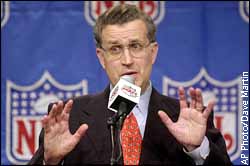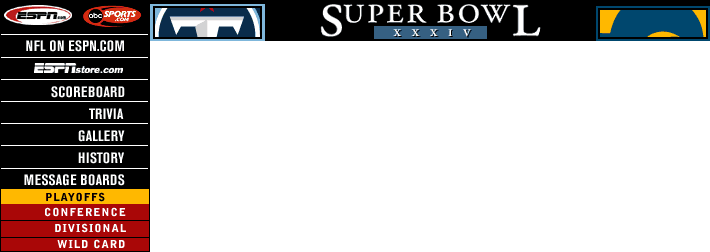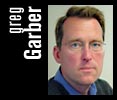ATLANTA -- More than 30 television cameras were aimed at the podium in the ballroom of the Atlanta Hyatt Regency on Friday. Men wearing headsets and suits hovered amongst the buzzing crowd of more than 1,500.
|  |
|
| NFL commissioner Paul Tagliabue came prepared for the tough questions Friday. |
But these weren't CIA operatives, protecting the President of the United States. They were NFL public-relations directors with microphones, facilitating media questions for league commissioner Paul Tagliabue.
While Tagliabue can't match the precise, polished presence of Bill Clinton, who delivered his State of the Union address Thursday night, Tagliabue is playing on a level field when it comes to spin. And that's saying something. As a lawyer and generally clever fellow, Tagliabue presented a bright-and-shiny vision of the future.
"The Super Bowl matchup underscores something very important about the strength of the National Football League," Tagliabue noted. "We have a system that works for all teams, no matter where they are located, no matter the size of the market they're in. Our system gives every team the same chance and gives the fans serious hope that their team can make the playoffs.
"The winner of the Super Bowl is not simply a matter of who has the most money, who is in the biggest city or just having one great player. It's a matter of who has an organization that can compete and build a team from top to bottom."
Original thinking in the NFL is rare; teams scavenge everything they can from those who reach the top. When the other 29 teams analyze the St. Louis Rams and Tennessee Titans, they will undoubtedly come to this conclusion:
It pays to move. Call this the Dislocation Bowl.
Not only did these teams leave Los Angeles and Houston for greener financial pastures, they enjoyed on-field success as well. What, exactly, is the message here?
"I've said many times it's unfortunate when any team ever has to move," Tagliabue said. "But I think what it does show is that those cities that made commitments to NFL teams, including Nashville and St. Louis, were well justified in making the investments they made.
"But it's not going to affect our policy, which is to discourage teams from moving and for making every effort, leaving no stone unturned to keep the team where they are."
Sure. Three teams moved in the 1980s: the Raiders, Colts and Cardinals. In the '90s, despite the league's "policy," four teams moved: the Rams, Titans, Ravens and, naturally, the Raiders.
Image, as always, is everything.
Super Bowl XXXIV has more than its share of warm-and-fuzzy storylines. There is the return of burned-out Rams coach Dick Vermeil, the rise from the ashes of the Arena Football League by quarterback Kurt Warner. The Tennessee Titans' Steve McNair has overcome great odds in his ascension to this ultimate game.
But this Super Bowl, this league, is all about bottom-line finances.
Teams aren't the only ones hop-scotching across the country. Coaches have gotten into the act. Three years ago, Bill Parcells walked away from the New England Patriots. Tagliabue brokered a draft-choice deal with the New York Jets, and Parcells was permitted to break his contract. Last year, Mike Holmgren worked a similar arrangement when he skipped out of Green Bay for the
cappaccino climes of Seattle.
On Thursday, the Patriots returned the favor to the Jets, signing Parcells disciple Bill Belichick. They will ship back the obligatory draft choices -- brokered by Tagliabue and his people.
That's three broken contracts in four years. But, please, don't call it a trend.
When Tagliabue was asked if he could guarantee that there wouldn't be more teams allowed in the playoffs when Houston rejoins the league in 2002, he didn't go there. Eight four-team divisions is a perfect excuse for the NFL to broaden the playoff pool closer to that exceptional model of the NHL.
Before Friday's question-and-answer session, Tagliabue offered a preamble about the NFL's Man of the Year award that honors a player's off-field accomplishments. He announced it was being renamed for the late Walter Payton. This year's winner is Minnesota wide receiver Cris Carter.
By wrapping himself in the fabric of their extraordinary lives, Tagliabue mitigated the impact of the first and obvious formal question
concerning the league's image in the wake of Rae Carruth, Cecil Collins and Steve Muhammad.
"Can we separate ourselves from society? Of course not," Tagliabue said. "Can we predict when a player, such as a Rae Carruth, can have a problem? Of course not. We can't predict that any more than others in society could predict when students would shoot other students or workers would shoot other workers in the workplace."
Make no mistake, this league is good. The braintrust understands marketing and product. With that kind of savvy behind him, Tagliabue could win the New Hampshire Democratic primary.
Greg Garber is a regular contributor to ESPN.com. His column will appear every day during Super Bowl week.



 Paul Tagliabue says the NFL does its best to help players with problems.
Paul Tagliabue says the NFL does its best to help players with problems.